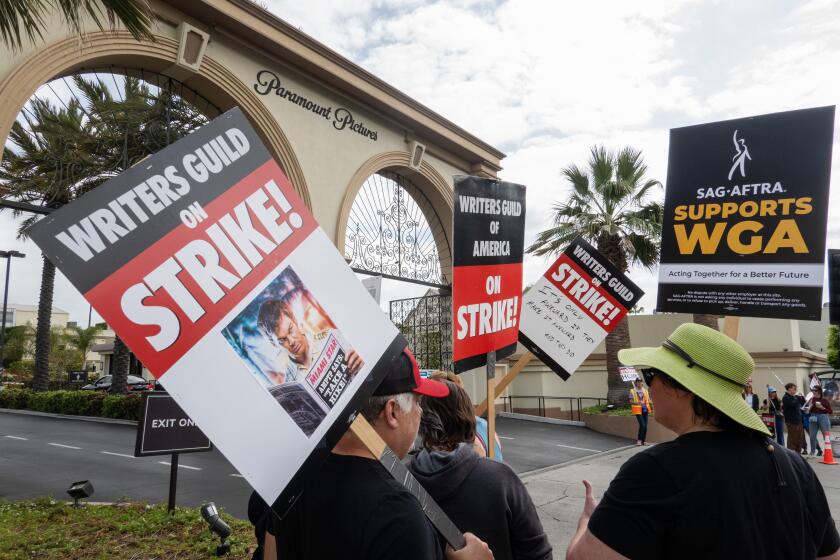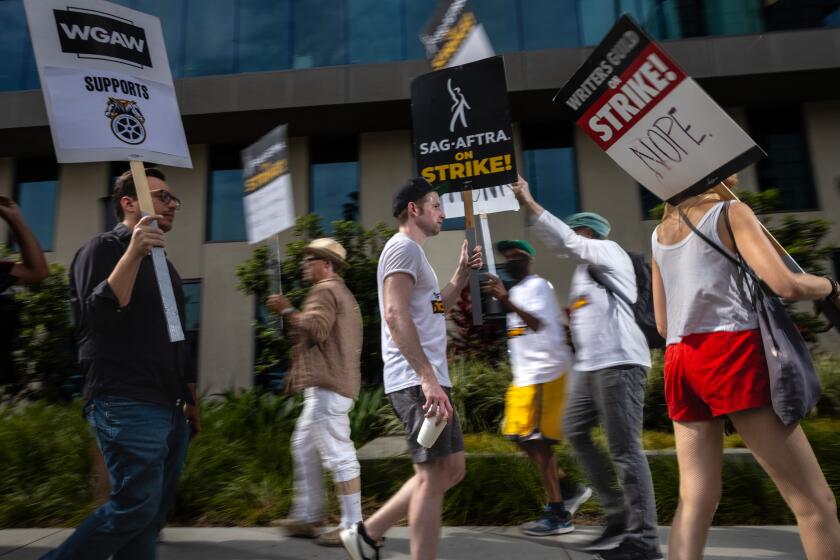Opinion: A big Clinton-era failure is one key reason labor unions are having a moment in L.A. and beyond

- Share via
This Labor Day, American workers are clearly on the offensive, with strikes and organizing drives on the upsurge from Silicon Valley to Detroit, in the corner coffee shop and campus quad and across California.
That militancy has many sources: a tight labor market that has boosted worker self-confidence, an inflationary spike that eroded wage increases, and a pandemic that showed many workers, “essential” or not, that managers and executives could not be counted upon to protect the health, jobs or income of those bearing the brunt of that extraordinary disruption.
How are corporations responding to all this? In earlier decades, we may have hoped for some voluntary transformation in corporate behavior — businesses choosing to boost wages and job security to take the socially responsible path.
About half of the big strikes in the U.S. this year have taken place in California, with the most consequential centered in Los Angeles — now including the strike announced by SAG-AFTRA.
But that has been a false hope, as recent history demonstrates. In the mid-1990s the economy was emerging from recession, but incomes were still stagnant. Massive layoffs at iconic firms including AT&T and Scott Paper were accompanied by a wave of mergers and soaring CEO compensation. Unions were weak and in retreat. A February 1996 Newsweek cover story by Allan Sloan labeled contemporary corporate aggrandizement “in-your-face capitalism.”
Robert Reich, President Clinton’s Labor secretary, thought he saw an opening. He wanted a new era of corporate social responsibility, generated by a certain set of incentives — public shaming for the highest-profile offenders combined with economic incentives for most firms — to nudge corporations toward a more humane norm. Reich sought to advance a “corporate responsibility” agenda tied to Clinton’s declaration that “the era of big government is over.” “If the government is to do less,” Reich told a George Washington University audience, “then the private sector will have to do more” — for example by limiting layoffs, raising pay and providing health insurance and pensions for workers.
Reich was not oblivious to the economic pressures facing corporations. “Exhortation alone won’t do the trick,” he argued in a memo to Clinton, “because top executives are under constant pressure from Wall Street.” He worked with Senate Democrats to craft a bill that would encourage “civic responsibility” by cutting the corporate tax rate from 18% to 11% for companies that put 2% of their payroll toward employee training and 3% toward a portable pension plan.
Such legislation stood no chance in the Republican-dominated Congress, but Reich thought Clinton could use his bully pulpit to galvanize working-class voters in the 1996 election. Clinton was intrigued, and pieces of Reich’s idea appeared in his speeches.
But this approach met resistance. Treasury Secretary Robert Rubin found the phrase “corporate responsibility” to be “inflammatory,” advising Clinton to reject such “class warfare language or criticism of economic success.” Rubin, who defended even the 40,000 AT&T layoffs, echoed Milton Friedman and other Republican-allied economists when he told the president, “Notions that corporations should serve any [other] constituencies or stakeholders easily lead to non-competitive companies, fewer jobs, and lower standards of living.”
Meanwhile, Reich doubled down on the phrase “corporate responsibility” if only because the president had used the word “responsibility” with many other initiatives, including on welfare, education and family values.
Reich was a lonely voice among Clinton’s close advisors. When the White House held a “Corporate Citizenship Conference” in May 1996, it was clear which side had won. Rather than focus on tackling mass layoffs, wage stagnation and income inequality, the CEOs there emphasized a corporate voluntarism and paternalism that celebrated so-called family-friendly workplaces, safety on the job and enough employee voice to create a sense of transparent fairness even “when restructuring and layoffs are essential to a company’s long-term health.”
Los Angeles is sitting at the vanguard of two trends: increasingly expensive housing and an increasing amount of cross-union solidarity.
The failure of the Clinton-era corporate responsibility initiative helps explain why we’re seeing so much worker militancy and government activism today. In place of that idea, two more robust movements are emerging to promise a better life for American workers.
First, the government has stepped in to play a more vigorous role in providing guidelines and incentives directing corporate behavior. In the 1990s, Joe Biden may have been a Clinton centrist as a senator, but as president he has adopted job-oriented programs long advocated by progressives: relatively “managed” trade with China; more than $1 trillion in job-creating infrastructure spending, much of it designed to transition into a green economy; and an industrial policy that uses government funds and incentives to revitalize the old Rust Belt.
Moreover, if activist regulators at the Federal Trade Commission and National Labor Relations Board get their way, corporate executives will find themselves “responsible” to customers, employees and the larger public in a fashion that Reich could hardly have imagined.
But there is a second, even more important path toward corporate social responsibility: the reappearance of vigorous trade unions, which are negotiating contracts that raise wages and pensions and provide healthcare. They are setting a standard, as with the new Teamster contract at United Parcel Service, that influences even nonunion firms.
Equally important, unions “police” corporate behavior by monitoring, publicizing and challenging corporate strategy in ways that force change on an often-recalcitrant set of capitalists. We can see that today in Hollywood, where striking actors and writers are trying to use their collective power to reshape the technology and business model of their industry.
In this context, the vague idea of corporate responsibility will be replaced by an older, better Progressive-era concept: an “industrial democracy” structured to give employees in every occupation a voice in their work lives.
Nelson Lichtenstein teaches history at UC Santa Barbara and is the author, with Judith Stein, of “A Fabulous Failure: The Clinton Presidency and the Transformation of American Capitalism,” which publishes on Sept. 12.
More to Read
A cure for the common opinion
Get thought-provoking perspectives with our weekly newsletter.
You may occasionally receive promotional content from the Los Angeles Times.












